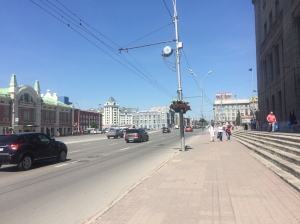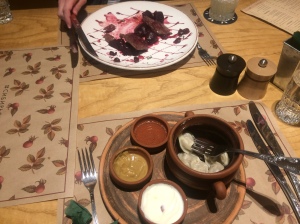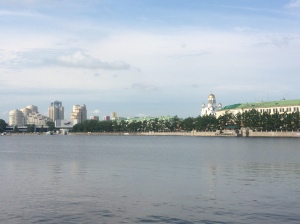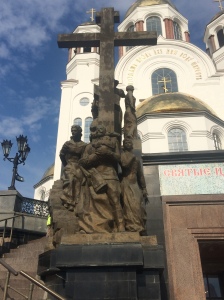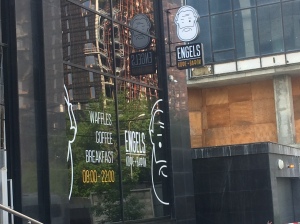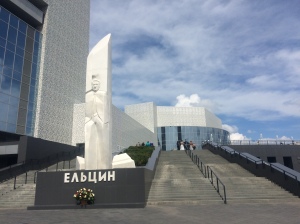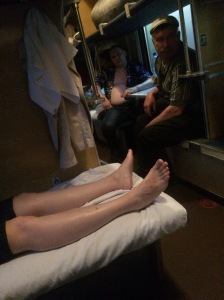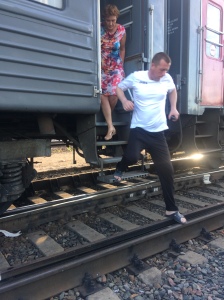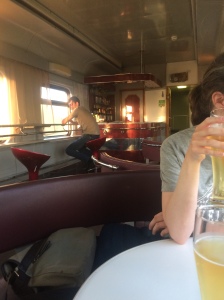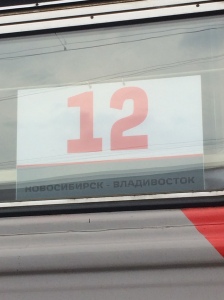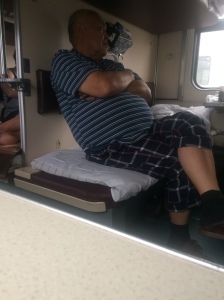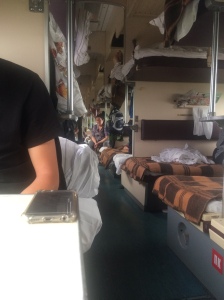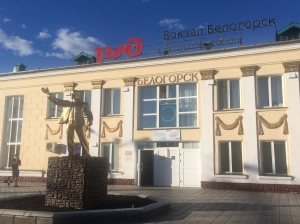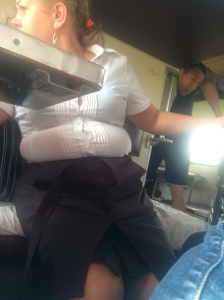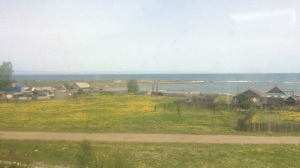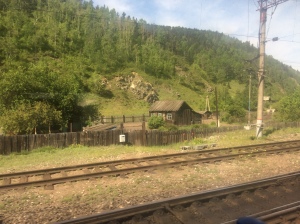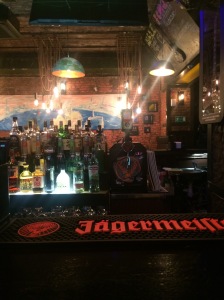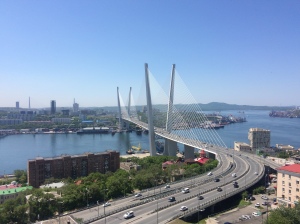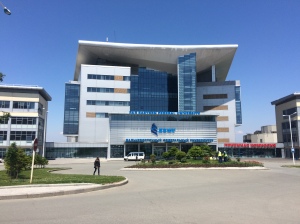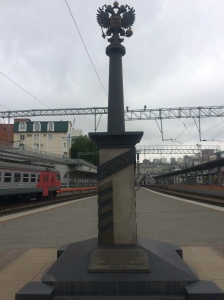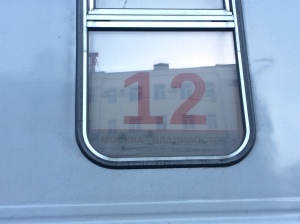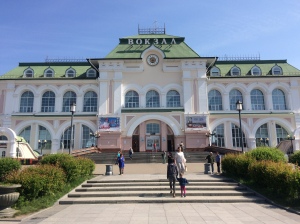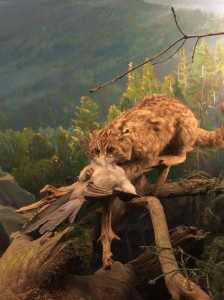Our train ride to Novosibirsk was uneventful. Our neighbors spoke briefly with us, but were mostly uninterested in us. We got a taxi to our hotel easily, and checked in early, which they didn’t charge us for. Normally it’s an extra charge, but the woman waved it as a present. She then said she would find out if we did or did not have to register there. After showering and changing, we headed off to an okay Mexican restaurant before going to a museum of Siberian architecture in a local design university. The museum mostly focuses on Novosibirsk and lots of the constructivist architecture in the city, but it also had examples of diagrams for typical Siberian wooden houses and plans for grandiose Soviet projects that were never built.
From the architecture museum, we went to the regional museum, which had an interesting series of exhibits on the history of Novosibirsk and the Trans-Siberian. Novosibirsk is a new city, only 124 years old, and exists only due to the railroad. Started as a railway settlement, it grew heavily during the years of Stalinist industrialization and industrial evacuation during WWII. At present, it’s the third largest city in Russia and is seen as the capital of Siberia. Despite these facts, there isn’t too much to see or do in Novosibirsk itself. It’s just a large, industrial center that doesn’t have too much of its own culture due to its youth.
One of the highlights of Novosibirsk was where we got dinner, a hipster, new Russian cuisine restaurant called #сибирьсибирь (#SiberiaSiberia). I finally got to try bear meat, which was prepared in pelmeni. Erin had some deer medallions, which were divine. We also had a great salad of pine nuts, greens, local cheese, and pesto.
After dinner, we went back to the hotel via a stop at a local craft beer place. While in line and trying to decide what to get, the very drunk Russian guy in front of us started to talk to us. He insisted on buying us beer, partially because we were Americans in Novosibirsk, and his daughter has just become an American citizen and lives in New York. He then tried to get us to join him and his friends at an apartment, but we declined and went back to our room, which we could only do after giving him our phone numbers. He also asked why we weren’t married and told us to get Russian husbands before letting us go on our way.
In the morning, we got up and ate breakfast in the room, which we had gotten the night before, while deciding what to see before out train to Yekaterinburg. I texted a friend of a friend about going to see the German POW monument in a cemetery in a certain district of the city. The local travel guide had warned against going to that area, and she confirmed that it was not good to go there without someone from the area, so we scratched that plan. Instead, we went to Akademgorodok, which is a scientific and university center on the outskirts of the city. Along the way, we stopped at a great railroad museum. It was full of a series of trains from steam engines and tsarist rolling stock to more recent cars and engines. We were allowed to go into a few of the cars. A highlight, or scary part, was when we went into a 4th class carriage made in the 1930s. This car featured the exact same hardware as on the 069Ya, Chita-Moscow train. The beds were exactly the same, which was a little off putting.
We also got to enter a car designed for transporting prisoners, which was rough. And we got to enter the cabs of a few steam engines, which was also really cool.
The train museum also had a small collection of Soviet cars; however, it didn’t have any UAZiki, so it’s not really worth talking about as a Soviet car collection. Amateurs.
From the museum, we took a marshrutka to the center of Akademgorodok and got some lunch at a stolovaya and saw the university grounds before taking a taxi back to the hotel to get our stuff and go to the train. The train from Novosibirsk to Yekaterinburg was train 091, from Tomsk to Moscow. It was brand new and very fancy. It was comfortable, had air-conditioning, and plenty of outlets. As a new train, it also had biotoilets, which means you can use the toilet whenever. On the older trains, the “flush” just drops waste onto the tracks. Thus, there are sanitary zones a certain distance outside of cities. The toilets are locked during station stops and in these zones, so it’s not always possible to use the toilet on the older trains.
Our train mates were quite the interesting bunch from Novosibirsk to Yekatrinburg. When we got on the train, we immediately attracted the attention of Nikolai, who was about 25 and quite drunk. He was excited to meet Americans and couldn’t believe that we were on the train. He then proceeded to tell people around him that there were Америкосы on the train. Amerikosy is slang for American, and is generally a derogatory term, but he seemed happy to meet us. He was from Tomsk and was riding off somewhere to work for Gazprom, the Russian gas company. He told us that we made a mistake not going to Tomsk, which he says is the best and prettiest city in Russia. “Come visit me, I have a motorcycle and will drive you around and show you the whole city,” he said multiple times. He promised to take us to the forest to gather mushrooms, which you can do from the motorcycle, and to take us fishing. We also had pleasant conversation with the slightly drunk Artyom, about 25, and Yura, about 45.
Immediately across from us were Galya and her 7 year old son Kolya. Galya was very religious. Her husband is an Orthodox priest and she was going with her son to visit her parents in Vladimir. She is a doctor by education, but now sings professionally in the church. Her son, a very bright and kind child, studies in a private Orthodox school in Novosibirsk. He had his English workbook on the table, and we offered to help if he needed it. Galya was very sweet, excited to speak with us, and helped us out when the drunk Nikolai got too rowdy.
Nikolai wanted us to drink beer with him. We were instead drinking kvass, the carbonated Russian bread drink (it’s literally made by squeezing water out of soaked bread). Eventually, with the help of Galya and Yura, Nikolai was ushered away and we were left to have more peaceful conversations with Galya, Yura, and Artyom. Yura was somewhat drunk, but he was a happy drunk. He was attempting to eat his sausage log to varying degrees of success. He started by just taking bites out, which he didn’t like. He couldn’t immediately find his knife, so he took a bottle cap and scooped out bite sized chunks of sausage. Eventually, he found his knife, a switch blade, and he asked us about life in American versus Russia. I don’t know what prompted it, but he told me to take his switch blade as a gift, and for protection. I politely declined at first, but he was adamant, so I took it. In exchange, I gave him a mostly empty pack of Marlboro Reds, which he was ecstatic to have. He made me write a note on the package for him.
After a while, we all went to sleep. Yura had a few issues. He folded down the table and put together his bed. He lay down and then mumbled to himself for a while. He asked for water, and Galya gave him some. He then went back to lying down and mumbling. After a few more minutes, he packed up his bedding, put the table down, and then made himself some instant noodles. Sometime after that, he went to sleep. Over the night, he got off of the train, and an Orthodox priest took his place. Galya had spoken with him in the earlier morning hours, and she introduced me to him after I woke up. He was pleasant to talk to, and was excited that two Americans were studying Russian history and riding out on the Trans-Siberian. He got off of the train a few stops before us. As he got off of the train, he blessed Galya and Kostya. He then turned to me and Erin and wished us success in our research and told us to return to Russia, “so that your souls can be happy.” I gladly accepted the blessing of sorts.
In the last few hours of our train ride, we spoke more with Galya. She offered us some hardboiled eggs and other food. She was surprised that we were getting off of the train alone in Yekaterinburg and taking a taxi to our hotel. When we arrived, though, we saw that it was easy to take a trolleybus from the train station to our hotel. We then checked in, showered, and changed before hitting the city.
Our first stop was a cup of coffee before heading to a comics shop that Erin had found through the internet. The comics shop was rad. I ended up buying two underground, trashy, locally produced comics, and the author/artist happened to be in the shop, so he signed one for me and drew a cool drawing in the other. I also got another Russian comic about bandy, which is also known as Russian hockey. Instead of a puck, bandy is played with a ball. The world bandy championships were held in Ulyanovsk in 2016. I was sad to have missed that.
From the comics shop, we just strolled around the city for a while. The area along the riverside was pretty. We heard music coming from an underground crossing, Nirvana’s “Smells Like Teen Spirit,” and went to investigated. In the underground crossing we found a guy playing guitar with a female drummer in a tunnel decorated with Viktor Tsoi graffiti. Tsoi is a super famous Soviet rocker who died in the 1980s. There’s a whole wall dedicated to him in Moscow just off of the Arbat. The duo played pretty well, and we listened to a few songs. A babushka came up and even dropped 100 rubles in their pot.
We made our way along the water to the Church on Blood. This church was built on top of the site where the Romanov family was murdered by the Bolsheviks in 1918. The church was quite impressive inside, and it housed a lot of information of Communist persecution of Orthodoxy in the early Soviet reign and the Terror. They had an interesting collection of documents such as lists of all of the churches that were destroyed and how many priests were killed. From the local archives, they had quite a number of execution orders on display.
From the somber atmosphere of the church, we went off to get dinner at an Uzbek place recommended to us by Dakota, someone else who also has our grant, but spent the whole year in Yekaterinburg. The food was indeed super yummy. We then went to Jawsspace, which is a bar that sells the beer brewed by the local company Jaws. From there, we ventured to a different bar—Amerikanka (American Girl)—across from our hotel. The bar was mediocre. While finishing our drinks, a guy of about 55 came to talk to us after noticing we were speaking in English. He wanted us to join him and some students for drinks, but we politely extricated ourselves to pass out.
In the morning, we got up and had a delicious breakfast at a place called Engels Coffee and Waffles. They had great waffles such as a banana one or caramelized apples. I’m sure Engels is overjoyed that his likeness is being used to sell hipster foods. From breakfast, we swung back to the hotel to pack up our stuff and stash it in the storage room before walking off to see the Boris Yeltsin Center. On the way, we saw a fishing tournament taking place on the river.
The Boris Yeltsin Center is fascinating, and very worth visiting. It’s a two story museum, as well as art gallery and multi-purpose space, that acts very much like an American presidential museum. The museum chronicles the life and work of Boris Yeltsin, the first president of Russia. He was from Yekaterinburg and rose to power there. The first floor of the museum describes the early life of Yeltsin, and the history of the USSR as a whole. Being a museum that celebrates the work of the guy who helped bring about and lead an independent Russia, its view of the communist years was quite grim. The second floor is organized around seven very important days of Yeltsin’s life such as a highly critical speech in front of the Central Committee of the Communist Party in 1987, the August Putsch of 1991, the Constitutional Crisis of 1993 (when Yeltsin called tanks to shell the Russian White House), Yeltsin’s health troubles, and his eventual resignation. We spent about three hours in the museum, and I could have easily spent the whole day there.
From the Yeltsin Center, we walked a bit deeper into the center of the city to meet a former student of mine from the Ulyanovsk Politech, Zhanna, who had moved to Yekaterinburg after finishing university. She came with her husband and we walked around a few of the central parks. Along the way we saw a neat monument to the computer keyboard and some outdoors exhibits of industrial history from the time of Peter the Great to Stalinist industrialization. The weather wasn’t complying too much, so we ducked into a café to chat and have tea for a while.
It was nice to catch up with Zhanna. She and her husband walked us back to our hotel, where Erin and I met Dakota, another student with our grant. We popped into a nearby Vietnamese restaurant before ducking into another restaurant to hide from the rain and get another beer before Erin and I had to catch our train. We had a good time discussing our different graduate programs and the pros and cons of researching in different Russian cities and archives.
After doubling back to the hotel to grab our things, Erin and I headed to the train station for our final ride, a 30 hour one from Yekaterinburg to Moscow. On the platform, we started to talk with a guy from Kyrgyzstan, who had a spot near us on the train. As our train departed around midnight, Erin and I waited for the train to start rolling. The conductor came by and took our tickets and handed us our bedding, and then we pretty quickly both went to sleep. Before I could sleep, the Kyrgyz guy was asking me about how he could get to America and differences between life in Russia versus America. He thankfully left me alone when I said that I wanted to sleep. He was even kind and got my bed roll down for me. After I got settled into my bed, I noticed him hanging around a bit, so I pretended to go to sleep. I heard him catch Erin and start talking to her. He was thankfully pretty respectful and left her to let her sleep after about five minutes of talking. When we got up in the morning, he was gone.
The ride back to Moscow wasn’t bad, but it was slightly unpleasant because we were on train 069Ya again, the Chita-Moscow train that was old. What was most annoying was our placement in the carriage. Our window was an emergency exit, so it did not open at all. Just walking a few feet over in the train was a relief from the heat and still air. The whole day on the train was fairly peaceful. We didn’t have neighbors most of the time, so we were left to our own devices. We read through our comics from Yekaterinburg. I ended up finishing some books and starting others. Over the course of the whole journey I read three novels, one monograph, one autobiography, a quarter of another novel, and about a third of “Doctor Zhivago” plus three short Russian comics. If you ever need to catch up on reading, take a trip on the Trans-Siberian. I haven’t “read” that much since preparing for dissertation qualifying exams.
During the full day on the train, we stepped out onto the platforms at station stops. At one station, the train was much longer than the platform. As we were in one of the first carriages, we walked off of the train and had to step down onto some parallel rail lines to get to the ground.
After some moderate boredom, and looking for a change of scenery, we walked to the restaurant car to have a beer. We managed not to die walking between the cars, which is always scary. On the way back to our carriage, we were walking through one car when the train had made a quick stop. The provodnitsa in that car was trying to sell some people some souvenirs. I waited a bit for her to stop blocking the aisle. Eventually she looked at me and said, “You can’t get out at this stop.” I responded that I didn’t want to get out, but that we were trying to walk back to our car, which was a different one. She seemed moderately annoyed by us walking through her carriage, and eventually let us pass.
The only really bad thing about our return to Moscow was the time that our train got in, a little after 4:00AM. I was rudely shaken awake at 2:30AM by a sadistic provodnik. At first, I thought it was the guy from the bed above mine being bad at getting in or out of bed. Instead, it was our warning to get up and use the bathrooms before they were locked before Moscow. I went to the toilet and then went back to sleep, only to again be violently shaken awake by the provodnik at 3:30 when he handed me my ticket. I then stayed awake as we rolled in to Yaroslavsky Vokzal. We got off of the train, and I called a Yandex Taxi to my dorm, as the Metro wasn’t to open for an hour.
My taxi was quite the adventure. My driver was Turkish, which I found out later, and spoke terrible Russian. He called me when he “arrived” and told me he was near a black car, to which I responded that there were many black cars. I said that I was by KFC, in both English and Russian, multiple times and explained that it was a chicken restaurant. He eventually understood and drove to find me. I’m not sure where he was originally, but it was quite far from the front of the station. In the cab, he asked where I was from. I said America. He then asked what nationality I was, to which I replied American. Unsatisfied, he asked where my mother was from. I said that she, and my grandparents, had been born in America. This did not please him either. He asked what nationality she was. I explained that she was German, Swedish, and Slovak. I said that I also had German, Russian, Norwegian, and Irish ancestry on my father’s side. He then asked if my relatives still live in Russia, to which I replied no. He couldn’t understand why I was in Russia or that I no longer really have family here. He asked what I was doing—studying I said. He asked if I wanted a Turkish boyfriend. Fearing where the conversation would go, I lied and said I already had a boyfriend. This then got him to ask why he wasn’t here in Russia. I lied again and said he had work in America and couldn’t come. The driver then proceeded to fail to properly listen to the navigation in the car and go the wrong way to the dorm, so I had to direct him myself. He then asked what school it was. Finally, as I managed to leave, he asked if I was going to rate him. I lied and said I would give him a 5 out of 5. Instead, I gave him a 3 and said that he doesn’t speak Russian well and can’t use the navigation.
I then wandered into the unlocked dormitory door without any issues, used my keycard on the turn style, came into the dorm, and passed out on my bed for a few hours of extra sleep before handling re-registration and heading off to an archive for a few hours.

